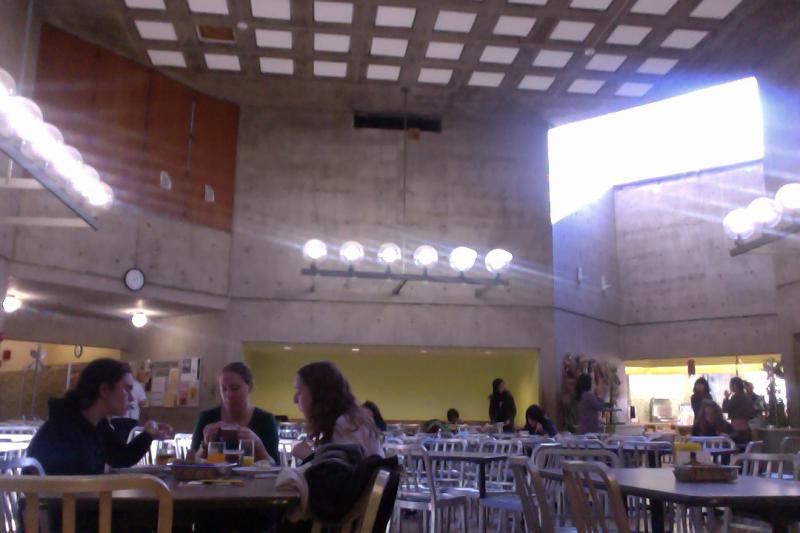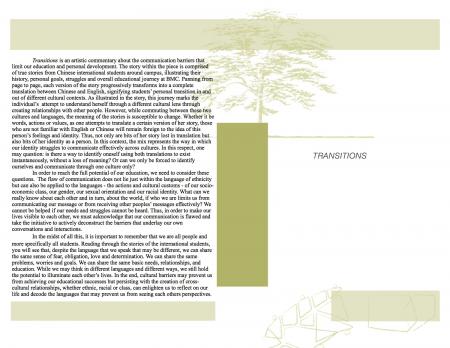Serendip is an independent site partnering with faculty at multiple colleges and universities around the world. Happy exploring!
ssaludades's blog
Communication with Different Perspectives
what ideas do you have for other ways to express and communicate ideas?
His disability helped me remember that people view information differently. Knowing this, in order to teach, we need to recognize these different perspectives and adapt the present information to the way that they see things - in the way that they see things. My brother’s visual learning is just one example, but it’s interesting to wonder how other disabilities - dyslexia, dysgraphia, dyscalculia - would have information presented as well.
Language, Class and Education
In class, it was mentioned that informal writing made material more personable. Decoding theories into basic terms helps some people relate to the information more easily and in turn, helped them apply it to their lives. In turn, this made me wonder: what are the boundaries of formal writing? If informal writing conveys the message with equal efficiency, is it even necessary to follow the rules of grammar? For those who don’t know certain terms or aren’t able to understand convoluted language, will they be barred from valuable knowledge and a certain level of critical thinking?
In this instance, I am reminded of my parents who are immigrants of this country. If they had not received the level of education that they had had, they would not have experienced their life in America and in turn, have the same opportunities as they do now. They would not have met the people that they do and learn from them. Even now, in being of a different culture, certain terms in the English language and certain actions as a language of our culture (eg. table etiquette, certain mannerisms, etc.) can still remain foreign to them . As a result, they may still have boundaries to overcome in order to achieve success in American society. In any case, as education is class coded and as education has deeply effected the way in which people are able to communicate, in turn, language can be class coded as well.
Interview Paper reflection
Usually, after reviewing class readings, I start an essay with the expectation of knowing (at least the guidelines of) what to write about. With readings, the argument is logically outlined and easy to follow. However, due to the open structure of my interview questions, I had to entrust my subjects, the international students, to guide me through their story, convoluted stories that involved different contradictory factors which made it harder to follow and produce a thesis. Furthermore, never having been an international student, I didn’t know what to aspect from them - what they want me to take away from their experiences, their needs and their story. I took this as a blessing because, having read Tuck, I did not want to taint my data with my assumptions and bias. I wanted my data to be raw and genuine.
In any case, working with the international students for this paper reminded me of our reading of Tuck in which I was researching not only to build a greater understanding but utilize it towards change. The paper wasn’t just about collecting what they were saying but trying to piece together what to do with this understanding, to create a message that would give these encounters meaning. Sometimes, I take for granted conversations and encounters with different people but having to develop a deeper meaning for this encounter helped me to remember the potential in interaction and in turn, active learning beyond the self.
Class Workshop: Ownership
One question that came up that really resonated within me throughout the workshop was: do we need to feel ownership over something in order to find comfortability? To me, it was interesting that some people said that they felt comfortable in the space that is Bryn Mawr without feeling ownership. The underlying principles of ownership include having freedom within the control of over one’s environment which I had felt was necessary in order to feel in responsible for one’s actions and their consequences and find purpose from that. In this way, the outcome that would make more sense to me that others would feel more productive and comfortable in being in places where they had command. Nonetheless, in trying to relate to those who did not need ownership, I realized that one could also find greater comfort in being in a collaborative community with other people or find productivity in being guided which made me think of the collaborative nature of school and the individual agency of the student.
Up until then, I hadn’t realized that comfortability held different meanings to everyone: it made me wonder about the different comforts that each class (social economic, gender, race, ability, ethnicity, etc.) nurtures for its constituents. do some cultures and classes nurture a community based on individual autonomy or collaboration? How is each beneficial? How do these clash or work together?
Space

There is a sense of belonging when it comes to one’s class. People from the same class usually hold a shared understanding of certain values, lifestyles. Being with these people from the same class who can understand these aspects about an individual can provide that individual with a sense of comfort and natural companionship. It’s feelings like this that helps to develop a sense of community and ‘home’.
In consideration to this, in approaching this essay I began to think of what my home meant to me and where I could find it at Bryn Mawr. At my ‘actual’ home, the meal time acted as a valuable retreat for my family. At the table, we would detach from what happened in our external lives and bring the focus to this communal moment. Thus, I decided to write about how mealtime contributes to the relationships within a class and affects interactions between classes and how the space is utilized to foster this growth.
Reflection on One's Access to Education
At the halfway point, In Class/OutClassed has helped me challenge the way in which I think about and approach education as an institution and experience. Before, I had figured that educational experiences were shaped by the backgrounds of the students and the characteristics of the class cultures alone; however, as classroom discussions unraveled, I began to scrutinize the educational system's structure and look into contesting the handling of its power. As a class, I have found that the opposing stances that we have held in participating in activities such as our classroom barometer has helped us formulate such ideas, forced us to take responsibility of what we think and test the credibility of the information we come across. Moreover, our discussions with writing partners has helped me recognize the faults in my communication and gradually propelled me to strengthen my voice and stance in my arguments within class. Overall, what we have learned in class so far has pushed me to become a more active participant in my own education and recognize that the quality of the educational process is more important in developing my perspective than the quantified measures such as grades and GPA that were once valued in high school.
The high school
Going to the high school, I want to expand my knowledge about different academic situations and the impact they have on students’ lives. Having gone to the same school for 12 years, I haven’t had much exposure to different academic cultures such as public and urban schools and thus, I am curious about the way the different backgrounds of the students in contrast to those that made up my class will have shaped the students’ expectations for their academic and vocational futures. Since I will be volunteering at the high school in the near future, I would also like to take this as an opportunity to observe the situations that the seniors I will be working with have faced in order to be able to understand them better and become the best help I can be for them. I would like to learn about the overall perspectives of the class, about how they see themselves in relation to their peers, the world around them and the authority figures that shape their lives; however, concurrently, I also expect that my questions won’t be definitively answered as the students may not open up as easily. I can’t just come into the school expecting that they will tell me everything about their lives, especially when I am a stranger asking about their personal academic and home life. I also can’t just make assumptions about aspects of their lives which may not be true. In any case, my main goal is to make a human connection, to have this be a learning experience that will not only benefit me but most importantly, benefit them.



